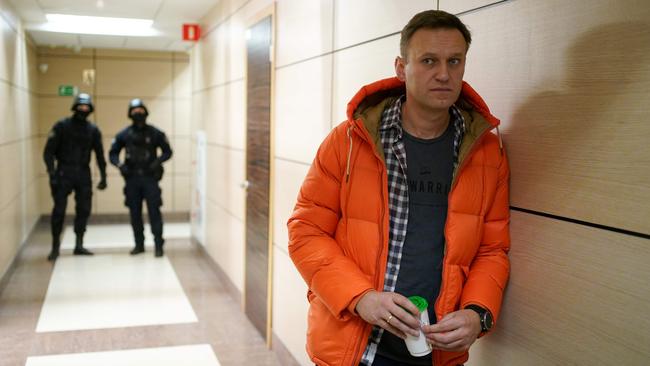Russia defiant on nerve agent: ‘No reason to blame us’
The Kremlin says there is no reason to blame Russia after confirmation Alexei Navalny was poisoned with a Novichok nerve agent.

The Kremlin says there is no reason to blame Russia after confirmation that opposition leader Alexei Navalny was poisoned with a Novichok nerve agent in an attempt to “silence” him.
Medical tests from German military’s chemical weapons laboratory had given “unequivocal evidence” that Mr Navalny had been afflicted by military-grade Novichok, a poison first developed by the Soviet Union towards the end of the Cold War.
But Kremlin spokesman Dmitry Peskov responded by saying: “We would not want our partners in Germany and other European countries to rush to some sort of judgment.
“There is no reason to accuse the Russian state.”
Mr Navalny, 44, last month became the latest in a long line of Russian defectors and critics of President Vladimir Putin to be poisoned in suspicious circumstances, and is now in a coma in a Berlin hospital.
The findings prompted “some very serious questions that only Russia can and must answer”, German Chancellor Angela Merkel said. “It is certain that Alexei Navalny is the victim of a crime,” she said. “He was meant to be silenced and I condemn this in the strongest possible terms.”
The news prompted a fresh round of condemnation from European leaders in an affair that has already sent tensions spiralling between Russia and the West.
British Prime Minister Boris Johnson said Mr Navalny’s poisoning was “outrageous”, while French Foreign Minister Jean-Yves Le Drian denounced the attack “shocking and irresponsible”. EU chief Ursula von der Leyen criticised a “despicable and cowardly act — once again”.
“The Russian people have a right to express their views peacefully without fear of retribution of any kind, and certainly not with chemical agents,” US National Security Council spokesman John Ullyot said.
NATO chief Jens Stoltenberg condemned the “shocking” use of a military-grade nerve agent which, he said, made “a full and transparent” investigation by Russia even more urgent.
Italy and Canada also condemned Mr Navalny’s poisoning.
The nerve agent can be deployed in an ultra-fine powder, liquid or vapour. It was famously used against ex-double agent Sergei Skripal in Britain in 2018, an assassination attempt that the West believes was ordered by the Kremlin despite Russia’s denials.
Mr Navalny fell ill after boarding a plane in Siberia last month, with aides saying they suspect he drank a cup of spiked tea at the airport. He was initially treated in a local Siberian hospital, where doctors said they were unable to find any toxic substances in his blood, before he was flown to Berlin for specialised treatment on August 22.
The Kremlin has questioned the credibility of German doctors and Russian scientist Leonid Rink dismissed the possibility that Novichok was used on Mr Navalny.
If it had been used, the opposition leader would be dead, not in a coma, Dr Rink told state news agency RIA Novost. “He would be taking a long rest in the cemetery, that’s all there is to it,” he said.
Ivan Zhdanov, the director of Mr Navalny’s Anti-Corruption Foundation, said the use of a “chemical warfare agent” made it clear the attack was organised by the state. “And it is responsible for the attempt on the life of a public figure. So naturally we demand the initiation of a criminal case and a normal investigation of all the circumstances of the poisoning,” he told Ekho Moskvy radio station.
The Charite hospital that has been treating Mr Navalny reported improvements in his condition. But the charismatic Yale-educated lawyer, who has been Russia’s leading opposition politician for about a decade, is still in intensive care and remains on a ventilator. “Recovery is likely to be lengthy. It is still too early to gauge the long-term effects which may arise in relation to this severe poisoning,” the hospital said.
Relations between the EU and Russia are particularly sour at present, the two sides at odds over a host of issues from Russia’s annexation of Crimea in 2014, its backing of Syrian leader Bashar al-Assad, and alleged election meddling.
The EU has had sanctions targeting whole sectors of the Russian economy in place since 2014.
Two years ago, the Kremlin was also accused of being behind the attempted murder of ex-double agent Skripal and his daughter Yulia in Salisbury, in the southwest England city of Salisbury, using a Novichok nerve agent.
The Skripals spent days in a coma before recovering, but local resident Dawn Sturgess died after picking up a discarded perfume bottle used to carry the poison.
EU members, NATO and other nations expelled more than 150 Russian diplomats in a co-ordinated action against Moscow over the Skripal case, leading to tit-for-tat reactions from Moscow.
AFP



To join the conversation, please log in. Don't have an account? Register
Join the conversation, you are commenting as Logout